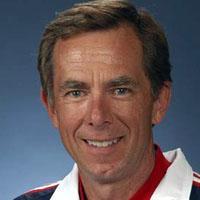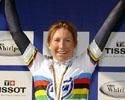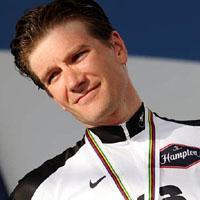
Recently on Cyclingnews.com |
An interview with Steve Johnson, January 7, 2009
State of the federation - Part I
Steve Johnson assumed the role of USA Cycling CEO in 2006 amid controversy surrounding the incumbent top dog, Gerard Bisceglia. Under Johnson's leadership the federation has developed and grown. With his contract up for renewal, Johnson spoke with Cyclingnews' North American Editor Mark Zalewski about his tenure at USA Cycling and what he looks forward to if it's decided he's the man for the future.

|
For almost three years, Steve Johnson has been at the helm of USA Cycling as it navigated the path through the sport's ever-changing landscape. At the time of his appointment, cycling in North America was still riding the 'Armstrong wave' of popularity as membership within the organisation continued to grow. Looking back, he said he is happy with the progress he has made and plans to continue in his position.
"I hope to," he laughs when asked if he wants to stay. "But it's ultimately the board's decision. My contract was through 2008, so we're discussing my terms."
As for what he thinks are his marquee accomplishments, Johnson is happy with solidifying cycling's place in the vast genre of 'Olympic sports'. "A lot of different components of the organisation have been modified or added that I have been a part of, and I am very proud of that," says Johnson. "Now we have a much better sense of where this organisation sits in terms of the development of the sport.
"I look back at my tenure here... I was first engaged as a consultant to redesign the athletic program, and out of that process came a new paradigm for athletics that was rather revolutionary," he continues. "It turned out to be very effective way to look at athlete programming, and because of that switch in philosophy we have been able to make decisions to produce remarkable results."
"In terms of our obligation to get to a level of sustained international success, we have never been stronger."- Johnson on America's place in international cycling. |
Despite what some may argue are inconsistent results at the international level, Johnson believes that, taken as a whole, the results are positive. "In terms of our obligation to get to a level of sustained international success, we have never been stronger," he says. "The coaching association started in 1999 has now grown to 1,400 members, providing a strong foundation for the continued development of the sport. You need coaches to help lower the barriers for new pre-professionals entering the sport."
Paralleling the international results, or possibly instigating it, is the level of opportunity and success of American cyclists at the professional level. "The professional component continues to be stronger, not withstanding the challenges presented by doping. But that is the nature of the beast, and even with that there are more professionals racing for teams than at any other time in our history," explains Johnson.
Johnson also points to the youngest segment of the federation's membership, which he says is beginning to bear fruit. "The junior development program has been very successful, especially on the regional level. The foundation, which I started with Thom Weisel in 2000, has raised more than $10 million, all of which goes into athletic programming."
Tough times ahead

|
Raising money is never an easy proposition, but the direction that the US and world economies is headed will make that task immensely difficult - something quickly becoming Johnson's paramount problem.
"I don't think any of us know exactly what it will mean," says Johnson of the current economic situation. "Talking to individuals I know in the advertising industry, there is still a lot of money rolling into advertising, so that may be a good sign. The stock market affects a lot of us approaching retirement age as we watch our nest egg dwindle! But how it was affect people's enthusiasm for bike racing, I don't know."
With the extent of the market plunge still unknown, Johnson says the prudent planning is conservative at best. "It may affect people's ability to travel - both internationally and regionally - so right now it can best be described as planning for the worst and hoping for the best. But even this year with gas prices where they were we have still seen a growth of events and that is a good sign for now. What 2009 will look like, we don't have a good sense of that.
"The good news is we created a more sustainable model for sponsorship and revenue for athlete programs using the foundation," Johnson continues. "We have been able to leverage direct athlete support through the Podium Program, which is a direct partnership with the Olympic committee. If we continue to do those kinds of things we will be fine. We struggled through a falling dollar against the Euro, which is particularly important for us because many of our programs have to be based in Europe. When we started the U23 program it was USD$0.80 to a Euro and recently it was USD$1.50! So we have to do more with less."
Organisational perceptions

|
In the past, USA Cycling has dipped in and out of controversy that sometimes bordered on impropriety. One of the consistent criticisms leveled at the organisation is a lack of transparency.
"I am all for transparency," says Johnson. "We do keep our heads down doing our daily jobs, and then have a board meeting. But we don't always think about how our actions are perceived by those outside the process. We have thought a lot about that and are moving on it - with these summits, for example - to get input from people.
"The board meetings are open for anyone that wants to sit through them. We encourage people to do that, though there is nothing secret going on at the board meetings, I can assure. There is a lot of mundane stuff though! We are running a business. But it's not fair to sit on the outside and complain about what we do without making the effort to find out what we do."
Recently another issue surfaced, involving board of director and trustee elections within USPRO. Will Frischkorn, Dylan Casey and Nick Reisted all ran for one of the two positions. Why did this present a problem? USA Cycling elections have historically been, well, ignored by members... on par with voter turnout of US elections (last year's elections excepted).
"This year we pushed the information and we had three nominees. As it turns out, Dylan [Casey] illustrated that the bylaws would not work with three nominees. In the past the one of the two with the most votes would become the USPRO board representative. But the bylaws only vaguely suggested there should be separate elections for each," explains Johnson.
"The good news is we created a more sustainable model for sponsorship and revenue for athlete programs..."- Johnson discusses funding in a difficult eonomic climate. |
"That is a sign of the times. We have never had more than two athletes run for that position. In fact, one year we had to re-run the election because nobody voted - not even the athletes for themselves! We used to have voter turnouts that would total teens in total votes. We have worked with the web and sent out reminder emails to get out the vote and to engage people. That has been very effective, with the number of votes cast reaching new records. This year with the USPRO athlete director election we had over half the athletes voting."
Some members had issues with how the problem was handled, specifically that the original results were thrown out and the election was re-run. "We sat down with the attorney and figured out we needed to re-run the election, which we did," Johnson says. "We had an open meeting about it and it was simply a procedural error."
The results of the re-run, with the new procedures, were the same as the original, with Frischkorn and Reisted elected.
Increasing communication
One way Johnson thinks the transparency issue could be addressed is by increasing the amount of communication between the various stakeholders of the organisation - another common criticism.
"It's incumbent upon us to engage all of the folks in our community, trying to make this sport work," says Johnson. "We serve as a clearinghouse for information, to disseminate ideas and best practices among promoters. These will be the first efforts to get that ball rolling. For us it will become an annual affair - in the fall last year but ultimately moved to the spring as we try to roll-up all of our calendaring to earlier in the season."
Johnson is adament that, "We want to share ideas of what works and what doesn't, to help everybody as best as we can and get us all on the same page. Particularly that on the NRC side, it has grown and is really hard to reserve and preserve weekends as events move around because of sponsors or communities. In the past we have tried to prevent overlap of events and now it is getting much harder. So that will be something we are really looking forward to talking about."
"We want to explain the logic, but also ask for input."
Check back with Cyclingnews for part two of our conversation with Steve Johnson as he elaborates upon issues within specific disciplines, this past year and the years to come.
Related articles:
State of the federation - Part II
An interview with Steve
Johnson - April 25, 2006
Johnson named USAC CEO
- May 7, 2006
Photography
For a thumbnail gallery of these images, click here
Images by USOC
- Steve Johnson has been the CEO of USA Cycling since 2006, overseeing a period of growth in the sport.
Images by AFP Photo
- Amber Neben is the latest American to be successful at the world championship level, winning gold in the women's TT in Varese last year.
Images by Riccardo Scanferla
- David Zabriskie is one of the most recognisable Americans on the world stage at the moment.
